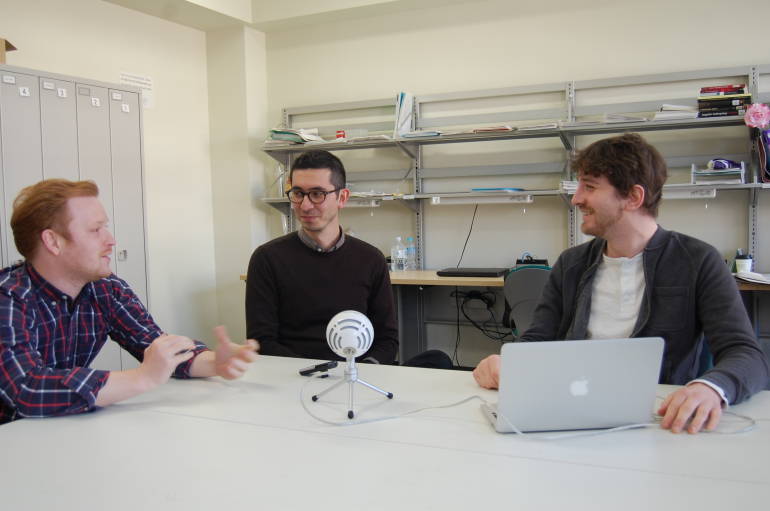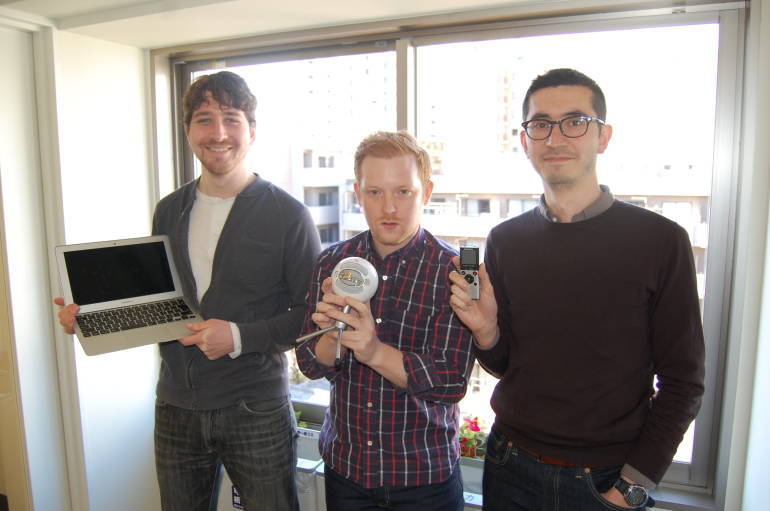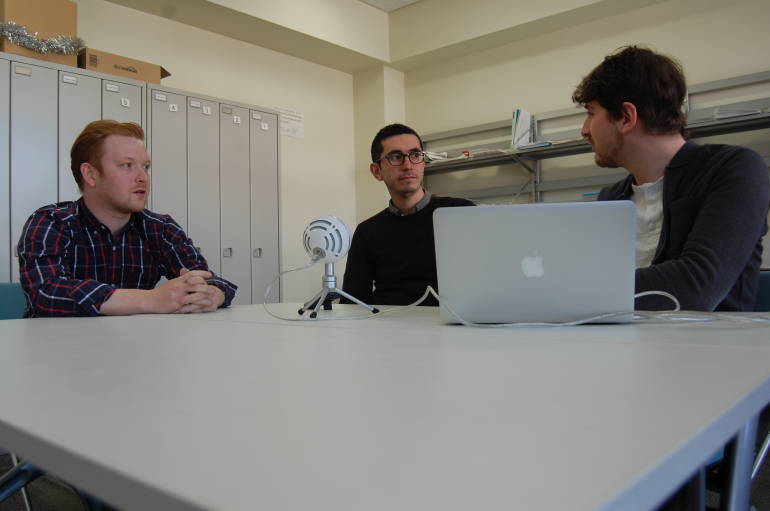With English-teaching being one of the main jobs held by foreigners in Japan, we’re happy to hear from podcasters and university instructors Matthew, Rob, and Matt, who explore various aspects of teaching English as a foreign language. They also throw in a few tips on how to start your own podcast on the cheap.

Who are you and what’s the idea behind your podcast?
We’re Matthew, Rob, and Matt, English-language teachers at universities in Tokyo and self-certified ‘TEFLologists.’ Our free podcast, TEFLology, is very much a hobby, and a chance for us to bounce ideas around and talk about all things TEFL* related. It was started as a way to make something more of bar conversations that we’d had with one another, and see if anyone else in the world shares the same interests as us.
*Teaching English as a foreign language
What can an English teacher/eikaiwa instructor learn from your podcast?
We hope first and foremost that English teachers and eikaiwa instructors alike can enjoy listening to the three of us talking about topics and ideas related to the profession, such as stories about ELT pioneers, introductions to theories and approaches, and any news and related developments in the field. We also include interviews with key figures, or as we like to call them, ‘TEFL celebrities,’ so listeners can have the chance to learn from accomplished and notable professionals. Although we don’t always talk about practical classroom activities, we hope that our podcast will open up listeners to the wider world of TEFL in a lighthearted and informal way. We appreciate that teachers in Japan are busy people, so hope that our podcast can be listened to on commutes to and from work.

TC: Cheapos have things to talk about too—how can someone start up a podcast with a minimal budget?
Starting a podcast is very easy, and can be carried out with minimal equipment. All you need is a computer, tablet, or smartphone with a microphone, a free hosting website that enables you to upload direct to iTunes, and, of course, something to talk about! If you want to improve the quality, we’d suggest investing in a podcast-friendly microphone and a hosting website with larger download limits (this will become more important as your listenership starts to grow). When interviewing on the road, consider buying an IC recorder, although even a smartphone would do the job. Tell people about it by making a Twitter account, keeping a blog, or by spreading the word with online adverts. Although podcasting can be done on a shoestring, the results of it have been more far-reaching then we would have expected, and we’ve been lucky enough to connect with other like-minded people around the world, and of course with TEFL celebrities that were once just names on books. Also, Tokyo is a major city that always has noteworthy people passing through, so there is always the possibility of attracting guests onto the podcast. We’ve been surprised about how far sending a simple email can lead. Oh and not to forget, catchy intros and outros are a must. You can use short clips from commercially available songs for free, or even better, write and perform your own, like we did!
TC: What do you like most and least about Tokyo?
Matthew: What I like most and least are the trains; it’s very easy to get around such a big city in an amazingly convenient way, although at the same time I never want to be stuck on a train too long.
Matt: I like the amount of cool and quirky shops and bars around Tokyo. There is something for everyone from all walks of life. People who have never been to Japan might feel that Tokyo is quite orderly, but Tokyo is surprisingly diverse. I also like the little hidden parks and green spaces around the city. On the other hand, I don’t care for the amount of crows in the city.
Rob: Bookshops are good. They always have a wide range of titles to choose from, and you can always go to a bookshop and read an entire book if you like—no one is going to tell you off! What I like least is the use of air conditioning, too hot in the winter, and too cold in the summer!

TC: What do you blow money on?
Matt: I blow money on craft beers. There are plenty of great bars around Tokyo selling both Japanese and foreign craft beers from a number of familiar and unfamiliar microbreweries.
Rob: Books, I blow most of my money on books. I also spend a lot of money on DVDs.
Matthew: I like to go to the cinema a lot, which is unfortunately quite expensive in Japan. Although I don’t have the luxury of blowing money on anything, a lot of it also goes on food and eating out.
TC: What are your top three Tokyo cheapo tips
Rob: My tip is that if you want a cheap day out, just find a river to walk along. You can always find a park, a temple, or an obscure historical site to explore with little or no money at all.
Matthew: If you don’t have one already, buy a bicycle. Although the cycling culture in Japan might be a little bit different to what you might be used to back home, Tokyo is a surprisingly good city to cycle around.
Matt: There are flea markets held all over Tokyo almost every weekend. Go and check them out, you can always pick up some cool items of clothing, historical trinkets, and possibly make new friends too. It’s often hard to sell your own clothes or items here I find, so flea markets may offer a better return than going to second-hand or thrift stores.
TC: How can people/fans/stalkers find out more about you?
You can subscribe to, and download our podcast for free from iTunes—just search for ‘TEFLology’. You can also follow us on Twitter @TEFLology, or email us at teflology@gmail.com. We’re also planning to give a presentation about our podcast at this year’s JALT conference in Shizouka, so please come and join us there! We’re always looking for feedback and new ideas, so feel free to rate our podcast and leave a review.



































